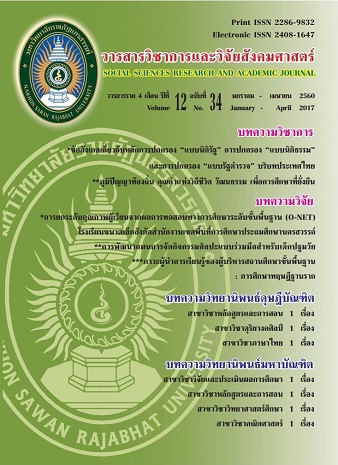แนวคิดการบริหารวิทยาลัยดุริยางคศิลป์มหาวิทยาลัยมหิดล; Administration Concept of the College of Music Mahidol University
Main Article Content
Abstract
บทคัดย่อ
งานวิจัยนี้มีวัตถุประสงค์ เพื่อศึกษาแนวคิดการบริหารวิทยาลัยดุริยางคศิลป์ มหาวิทยาลัยมหิดล โดยใช้การประเมินผลเชิงดุลยภาพ 4 มุมมอง เป็นส่วนในการแปลงแนวคิดไปสู่แผนปฏิบัติการ กลุ่มตัวอย่างประกอบด้วยผู้ที่สามารถให้ความคิดเห็น และให้ข้อมูลเกี่ยวกับการบริหารงานในวิทยาลัยดุริยางคศิลป์ มหาวิทยาลัยมหิดล จำนวน 12 คน การศึกษานี้ดำเนินการตั้งแต่เดือนมิถุนายน 2010 ถึงเดือนเมษายน 2014 และการวิจัยแบ่งออกเป็น 3 ขั้นตอนดังนี้ 1) สำรวจและเก็บรวบรวมข้อมูลพื้นฐาน 2) รวบรวมข้อมูลพื้นฐานเชิงลึก
3) วิเคราะห์ข้อมูลและอภิปรายผลลัพธ์ในรูปแบบพรรณนาวิเคราะห์
แนวคิดในการบริหารงานของวิทยาลัยดุริยางคศิลป์มุ่งเน้นไปที่ความเป็นเลิศและการใช้วิธีประเมินผล เชิงดุลยภาพ 4 มุมมองเพื่อแปลแนวคิดลงในแผนการดำเนินงาน ส่งผลให้มีการสื่อสารที่ดีขึ้นระหว่างคน
ผลของการวิจัยพบว่า วิทยาลัยดุริยางคศิลป์ มหาวิทยาลัยมหิดลใช้หลักเกณฑ์ในการบริหารเชิงกลยุทธ์ในการปรับปรุงและทบทวนยุทธศาสตร์เดิม นอกจากนี้ยังใช้วิธีการประเมินผลเชิงดุลยภาพเพื่อประเมินผลการพัฒนาเชิงกลยุทธ์ขององค์กรใน 4 มุมมอง ได้แก่ 1) มุมมองด้านการเงิน ประกอบด้วย ประสิทธิภาพของงบประมาณ ความมั่นคงของงบประมาณ 2) มุมมองด้านลูกค้า ประกอบด้วย ศาลายาเป็นศูนย์กลางการศึกษาดนตรีระดับนานาชาติ เมื่อความไพเราะของโลกมาอยู่ที่ศาลายาแม้แต่เทวดาก็อยากฟัง เน้นมืออาชีพระดับชาติและนานาชาติ 3) มุมมองด้านกระบวนการภายใน ประกอบด้วย คุณภาพนิยม พรสวรรค์สร้างได้ ศาสตราจารย์ศิลปิน คิดทฤษฎีหัวจรวด ชื่นชมความเป็นฉัน จิตวิญญาณนิยม สิ่งแวดล้อมและบรรยากาศสร้างรสนิยม ยอมรับในความแตกต่าง การบริหารจัดการอย่างมีประสิทธิภาพ 4) มุมมองด้านการเรียนรู้และการเติบโต ประกอบด้วย การบริหารจินตนาการ
ในองค์กรและเพิ่มความเข้าใจซึ่งกันและกันโดยใช้คำที่จดจำได้ง่าย เป็นผลให้ผู้บริหารวิทยาลัยสามารถนำองค์กร
ได้อย่างมีประสิทธิภาพ
Abstract
This research has the objective of studying the administration concept of the College of Music, Mahidol University. The research applied the Balanced Scorecard assessment method in four perspectives, which altered the concept as the operational plan. A group sampling of 12 people was the principle way of receiving opinions and information about the administration concept of the College of Music, Mahidol University. The study lasted from June 2010 to April 2014 and the research was divided into the following 3 stages: 1) Exploring and gathering basic information. 2) Gathering deep background field information. 3) By analyzing the information and discussing the results in the form of a descriptive analysis.
The results showed that the College of Music at Mahidol University always applies strategic administration principles to improve and review the old strategies. Furthermore, it applies the Balanced Scorecard (BSC) method to provide an assessment of the organisation’s strategic development in four perspectives, namely: 1) The Financial Perspective: consisting of the budget’s effectiveness and the organisation’s fiscal health. 2) The Customer Perspective: consisting of Salaya Campus as the Center of International Music Study with the emphasis on students having a career in Thailand and internationally. 3) The Internal Process Perspective: consisting of how quality and talent can be created and developed; the artist-professor concept; rocket theory; admiring one’s uniqueness; spirituality; creating tastefulness through the environment and atmosphere; accepting each other’s talents and differences; and administering effectively. 4) The Learning and Growth Perspective: consisting of imagination management and administering the concept of the College so that it becomes a widely accepted organization.
This administrative concept of the College of Music focuses on excellence and on using the Balanced Scorecard assessment method in 4 perspectives to translate the concept into an operational plan. It results in improved communication among people in the organization and enhanced mutual understanding by using easily-remembered words. As a result, the College executives can lead the organization more effectively.

